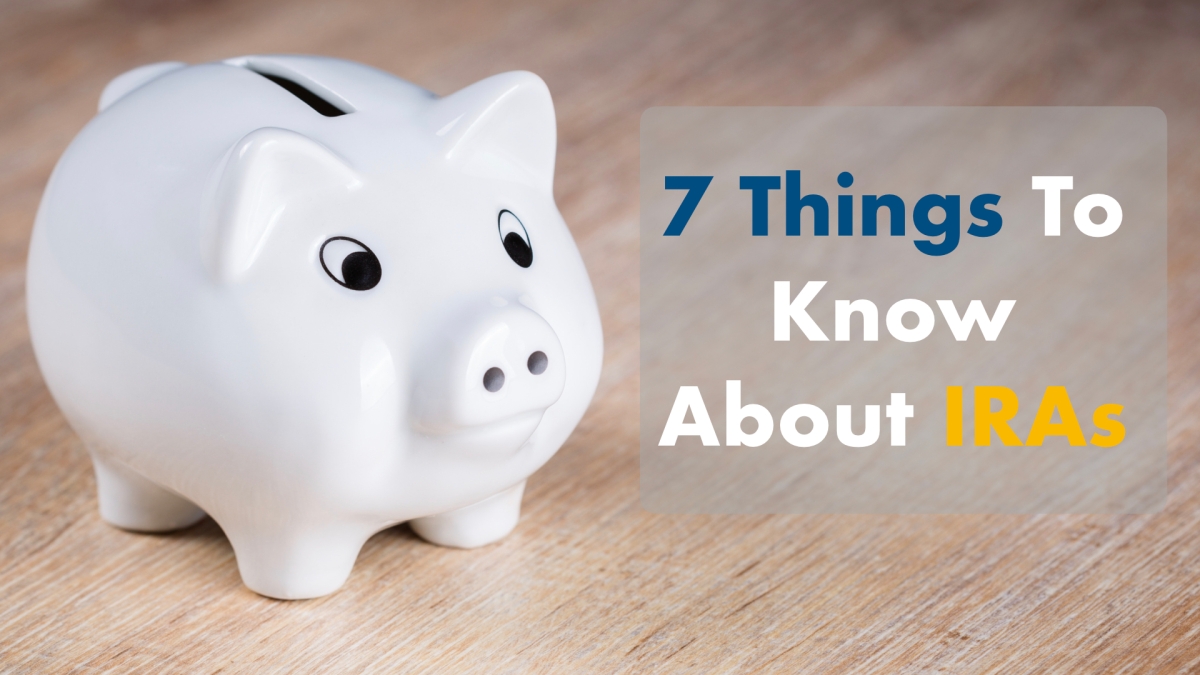By now, you’ve probably heard a friend or colleague talking about their IRA or their Roth — how it’s performing, their investments, etc. They sound like an adulting boss with their ish together.
Then you wonder, what the heck is an IRA? So, here are 7 things to know about an IRA.
- It’s A Retirement Account —
What does IRA stand for? IRA stands for “individual retirement account.” This means it gets favorable tax treatment in exchange for some rules regarding when you can access the funds. While there are a few rare instances where you can take a distribution early, the idea is to plan on waiting until you’re 59 1/2 to access the funds… it’s a retirement account remember? The purpose is to save for retirement — not for buying a boat next year.
- Traditional V. Roth (The Tax Treatments) —
Traditional means the dollars are going in pre-tax. So, you’re not paying income tax on the money you’re contributing. The contribution earnings grow tax deferred so, you pay taxes on the way out according to your income bracket upon the time of the distribution (withdrawal). – Roth is essentially the opposite. The dollars go in after tax, you you don’t get any deduction for your contribution. But, the earnings grow tax free so you never have to deal with taxes on those dollars again. The entire balance is yours after 59 1/2, so you don’t need to worry about accounting for taxes on any withdrawal you make in retirement. Also, there are income limits set, so there’s a possibility you could make to much to qualify (a good problem to have). So for, a single person breaking six-figures of income, you’ll want to talk to your accountant and may need to look elsewhere. - It’s Not An Investment In and Of Itself —
An IRA is an account, not an investment. A lot of people think a “Roth” or an “IRA” is an investment, and ask “how are Roths doing these days?” These are account types, there is a plethora of investment options you can put inside of the accounts. Most people typically invest in a portfolio of stocks, bonds, and mutual funds. - You Gotta Start Somewhere —
Baby steps! You may not be rolling in the dough – but it’s always a good idea to start saving for the future. IRAs can be a great tool to start saving for “future you.” They force you to put away long-term dollars, and don’t really have minimums. So, if you can only afford to put away $50/month — this could be an option to explore.
- Contribution Limits —
For those with extra cash, you may not be able to throw it all in your IRA. For people under 50, our contribution limit (annually) is $5,500. - It Probably Won’t Sustain Your Retirement —
$5,500 annually, even with compound interest, probably won’t set you up for retirement. Unless you have a massive pension, you’ll want to be saving more for a comfortable retirement. A financial advisor is the perfect place to go — they can model out a plan custom for your goals. You’re never too young to begin a conversation. Ask for trusted recommendations from your friends, family, and successful mentors you know. - Know Where To Go. — Not all financial firms were made equal. Don’t just go to your bank and open up the first thing they recommend. Do your research and find a trusted financial advisor you feel comfortable with who knows you, your goals, and your story.
This article is solely intended to provide information regarding the subject matter covered. If legal advice, investment advice, or other professional assistance is desired or required, seek the services of a competent, licensed professional.
—
Do you feel like your style, career, or personal brand could use a confidence booster of it’s own? We are here to help. Check out all of the ways we can help you optimize your life. You’ll be glad you did.
As always, drop us a note with any thoughts. We appreciate you.
